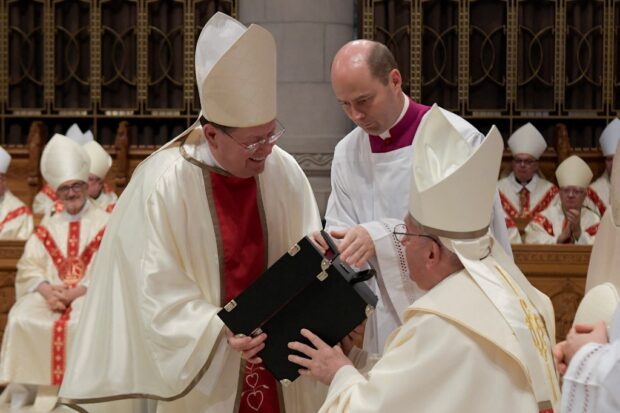Vatican closes sexual assault probe into Canadian cardinal

(FILES) In this photo taken and released on July 28, 2022 by the Vatican press office, Pope Francis (R) and the Archbishop of Quebec, Cardinal Gerald Cyprien Lacroix, celebrate Mass at the National Shrine of Sainte-Anne-de-Beaupré in Quebec, Canada. An inquiry ordered by Pope Francis into an allegation of sexual assault against a Canadian cardinal has found no evidence of wrongdoing, the Vatican said on May 21, 2024. (Photo by Handout / VATICAN MEDIA / AFP)
Vatican City, Holy See — An inquiry ordered by Pope Francis into an allegation of sexual assault against a Canadian cardinal has found no evidence of wrongdoing, the Vatican said Tuesday.
Cardinal Gerald Lacroix, the 66-year-old archbishop of Quebec and a member of the pope’s C9 advisory council, had been accused of sexually assaulting a teenage girl in the 1980s.
READ: Vatican probing John Paul II aide over abuse cover-ups
“In the light of the facts examined by the judge, the report does not permit to identify any actions that amount to misconduct or abuse on the part of Cardinal Gerald C. Lacroix,” the Vatican said in a statement.
“Consequently, no further canonical procedure is foreseen.”
Article continues after this advertisementHowever, the retired judge who wrote the report later published a statement saying he lacked an “important piece of evidence” in that he was unable to meet the plaintiff.
Article continues after this advertisementThe plaintiff’s lawyer Andre Arsenault called the Vatican probe “flawed,” telling AFP: “In no way is this an independent justice system.”
The claims against Lacroix date back to 1987 and 1988, when the alleged victim was 17, and are part of a class action suit against more than 100 priests in the archdiocese.
READ: Awful truth: Child sex abuse in the Catholic Church
Lacroix, Quebec’s archbishop since 2011 and a cardinal since 2014, denies the allegations.
In January, he said he would pause his duties until the situation was cleared up, but he attended a Council of Cardinals meeting at the Vatican last month.
‘Only reservation’
Pope Francis asked retired judge Andre Denis in February to assess the facts in the case and establish if there was enough evidence to warrant a canonical — or Church — trial.
Denis has previously studied thousands of sexual misconduct allegations against the Church dating back to the 1940s, and authored a report that confirmed or substantiated dozens of claims.
In a statement Tuesday, he said it was the first time in the recent history of the Catholic Church that the pope had chosen a lay person to investigate a cardinal’s conduct.
Explaining his decision, Denis said his findings made it “implausible” that the alleged assault by the cardinal occurred — but with a caveat.
“My only reservation was that I was not able to meet the plaintiff as I would have liked to do. I am deprived of an important piece of evidence,” he said, explaining that he had sought several times to meet her or have access to her complaint, but she refused.
Arsenault said his client maintains “obviously all of these accusations,” and will continue to pursue the cardinal in a Canadian court. More testimonies are being added to the class action lawsuit each week, he added.
Denis’s report into Lacroix was concluded on May 6 and delivered to the pontiff in the days that followed, the Vatican said in its statement, which was translated into English and French, Canada’s two official languages.
Pope Francis thanked Denis for carrying out his probe within the timeframe requested and acting “with impartiality in the context of the class action lawsuit brought against the Archdiocese of Quebec”.
The class action lawsuit in Canada includes testimony from 147 people who claim they were sexually assaulted by more than 100 priests in the archdiocese, according to court documents.
Continuing to claim his innocence, Lacroix will maintain a low profile, while efforts continue to try to reach an “out of court settlement” of the lawsuit, the diocese said in a statement.
Besides Lacroix, the accused also include Cardinal Marc Ouellet, once considered a strong candidate to be pope, who also says he is innocent of the accusations.
Francis, 87, has insisted on a “zero tolerance” policy on sexual abuse in the Catholic Church, following multiple wide-reaching scandals, most involving minors.
In 2019, he defrocked then cardinal Theodore McCarrick, one-time archbishop of Washington.
A Vatican investigation found that McCarrick had hidden regular sexual contact with adult seminarians and at least one minor.
The Argentine pope has also created an advisory commission for the protection of minors, lifted papal secrecy on sexual abuse by clergy and obliged both clergy and lay people to report all cases to their superiors.